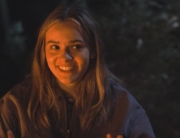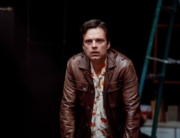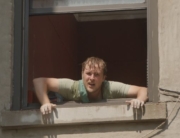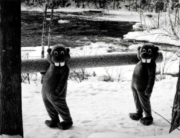Relaxer is what I consider a wavelength film. It’s distinctly odd and way out of the mainstream, with a sensibility and aesthetic that will cater to a very small subset of folks. If you are on its wavelength, it’s cinematic gold. If not, you simply don’t know what the hell you’re watching.
Relaxer centers on a man sitting on his couch playing Pac-Man. For months. That’s it. That’s the plot. It begins in the year 1999 with said man, Abbie (Joshua Burge), a tall, lanky, hawk-nosed young man with soulful eyes, pushed to consume a gallon of milk eight sips at a time out of a baby bottle with a straw in the nipple. This is being recorded by his older brother, Cam (David Dastmalchian), a feral Trent Reznor type whose pants are held together by duct tape. Cam taunts Abbie mercifully, reminding him of other “challenges” he has failed. This all takes place in the living room of Cam’s low-rent mess of an apartment somewhere in the Midwest. There’s graffiti on the walls, food wrappers on the counter, and everything looks extraordinarily cheap.
At this point, we seem to have been dropped into a mallrat version of Sam Shepard’s True West. There’s a contentious relationship between the dominant and passive siblings, a father who disappeared from their lives when they were young, and a mother whose use to them is having nothing more than a convenient place to crash for a night. Either way, it’s a pretty intriguing setup from writer-director Joel Potrykus that gets sidelined when a gaming magazine arrives in the mail. In this magazine, the infamous gamer Billy Mitchell describes hitting level 256 in Pac-Man. Cam has a revelation and decides that Abbie must reach that level before he returns from an errand. And he cannot leave the couch. Cam does not return, and Abbie does not leave the couch.
You would figure that watching a dude play Pac-Man would be boring and dull. Sure, some people will watch this film and say, “Yup, this is dull as dirt,” but the way that Potrykus portrays the ultimate in slackerdom is damning, pathetic, and occasionally desperately funny—Abbie’s attempt to get water from the pipes in the wall is worthy of a Mr. Bean skit. His desperate pleas to get his tweaked-out friend Dallas (Andre Hyland) to just give him the soda he asked Dallas to buy is cringe-making comedy at its best. Relaxer constantly surprises and reveals unexpected depth.
A lot of this is thanks to Burge’s soulful performance. Unlike his character in Buzzard, Potrykus’s previous film, where Burge essayed the nihilist soul of low-rent, privileged masculinity, Abbie is a mush. He can’t seem to get anyone to help him, and he’s helpless in the face of his older brother. A “challenge” to him, especially involving Pac-Man, is life or death, meaningless as it is. While the world is falling apart around the brothers, they are busy trying to high score a video game. Burge plays this all as a stunted, overgrown child. Petulant and pleading, with a sadness leaking through his large blue eyes, you can’t help feeling sympathy for a man who puts on 3-D glasses when he’s feeling angry or hurt to manage his feelings.
The entire film takes place in one room, and cinematographer Adam J. Minnick does a commendable job keeping us occupied enough to not feel overly claustrophobic, and the production design is spot-on. This is a place where when one knocks on the front door, you can hear that the door is pretty much hollow and constructed of pressed wood. There are no closets, just piles of clothes and racks with videogames in them. Everything has a thin veneer of crusted something or other, and it is important to note it’s not Abbie’s place, but his brother’s. Abbie lives with his mom, who, judging from the lack of calls, has no concern of where Abbie’s whereabouts.
The last third of the film moves from bleak to very black comedy and exerts a sort of menace that has been lurking in the corners. It moves solidly into Sam Shepard territory with a splash of, and at one point a very direct homage to, Cronenberg. It turns out the whole movie has been about family. In retrospect, that’s obvious. We are shaped by and can’t escape our family. They are in us and against us, and if we don’t make peace with that, heads will roll and, in some cases, explode.







Leave A Comment